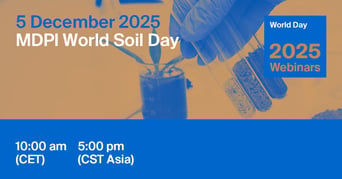News & Conferences
Latest News & Announcements
Latest Conferences
Propose a Conference Collaboration
Promote and publicise your upcoming conference with MDPI.
All News & Conferences
News & Announcements
Acknowledgment to the Reviewers of Coasts in 2025
6 February 2026
News & Announcements
MDPI INSIGHTS: The CEO's Letter #31 - MDPI 30 Years, 500 Journals, UK Summit, Z-Forum Conference, APE
2 February 2026
News & Announcements
MDPI at AGU 2025: Celebrating Open Science and Academic Excellence
26 January 2026
News & Announcements
Meet Us at the Ocean Sciences Meeting 2026, 22–27 Febuary 2026, Glasgow, UK
23 January 2026
News & Announcements
MDPI’s Newly Launched Journals in December 2025
9 January 2026
News & Announcements
Meet Us at the EGU General Assembly 2026, 3–8 May 2026, Vienna, Austria
6 January 2026
News & Announcements
Article Layout and Template Revised for Future Volumes
11 December 2025
News & Announcements
World Soil Day—“Healthy Soils for Healthy Cities”, 5 December 2025
5 December 2025
5 - 5 December 2025
News & Announcements
MDPI Webinar | World Soil Day, 5 December 2025
28 November 2025
News & Announcements
Meet Us at the 2025 International Conference on Frontiers of Ocean Science and Technology, 21–23 November 2025, Tianjin, China
20 November 2025
of 10








